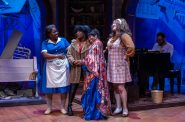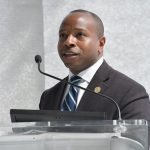An Interview with Paul Robeson
By Jill Gilmer

Interviewer: “Why did you stop making films?”
Paul Robeson: “Because little Negro girls go to the movies looking forward to experiencing fantasy. But when they come home, they feverishly try to rub the color off of their skin.”
The excerpt above is one of the provocative question & answer segments from An Interview with Paul Robeson. The Next Act Theatre opens its season with this probing drama about the legendary African American scholar, entertainer and political activist. The play, written by John Kishline and Paul Mabon Sr., with Mabon starring in the title role, examines Robeson’s life and legacy through a lively discourse between him and a New York Times reporter.
Paul Robeson appeared in 12 films and stole the show in the musical Showboat with his soulful rendering of “Ole Man River.” In 1943, he achieved critical acclaim playing Othello in Broadway’s longest running Shakespearean play. Prior to establishing himself as a performer, Robeson led a distinguished academic career. He overcame overt racism and physical abuse to graduate as valedictorian of his class from Rutgers University in 1918, the third black student to attend that institution. In his spare time on campus, he earned 15 athletic letters in football, basketball, baseball and track. He went on to graduate from Columbia Law School.
Beyond this string of accolades, Robeson is well-known for using his celebrity to draw attention to social and political issues. He criticized the racial stereotypes that permeated American media during the Jim Crow era and challenged the idea that black people should fight to defend a country that denies them many of the privileges of citizenship. Robeson defended his provocative beliefs with personal sacrifice. He stopped making films that perpetuated racial stereotypes. He announced that, for two years, he would only perform songs about social justice. Robeson’s actions are sometimes credited with jump-starting the Civil Rights movement.
Robeson was also a target of the McCarthy era investigations. On several occasions, he visited the Soviet Union and found it a warm and welcoming nation. For urging peace with the Soviet Union and his outspoken views about race in the U.S., the House Committee on Un-American Activities blacklisted his films and recordings for eight years. They also revoked his passport, limiting his opportunity to perform in Europe, where he had his strongest following. Today, it is still difficult to obtain copies of Robeson’s work.
Given Mabon’s powerful singing voice, the play is surprisingly better at engaging the mind than the heart. Some of the songs seem oddly out of place, as if secondary to the story of Robeson’s evolving political views. It would be interesting to see Paul Mabon embrace Robeson’s emotional side with the same enthusiasm he has for his intellect.
An Interview with Paul Robeson offers a thoughtful tribute to Paul Robeson’s legacy. History should consider one of his great contributions to be his commitment to using his career as a tool for community service. His willingness to make personal sacrifices to support a broader societal goal is a rarely-seen virtue among today’s Hollywood celebrities. (Imagine Britney denying herself for the good of society.)
In one segment of the play, the interviewer challenges his outspokenness based on its consequences to his career. The fact that a story about Robeson can play to a sell-out crowd in 2007 is evidence of how wrong that prediction was. VS
An Interview with Paul Robeson runs through October 21 at the Off-Broadway Theatre, 342 N. Water Street. For tickets, call (414) 278-0765 or visit http://www.nextact.org.
Theater
-
‘The Treasurer’ a Darkly Funny Family Play
 Apr 29th, 2024 by Dominique Paul Noth
Apr 29th, 2024 by Dominique Paul Noth
-
Rep’s Nina Simone Play a Puzzle
 Apr 23rd, 2024 by Dominique Paul Noth
Apr 23rd, 2024 by Dominique Paul Noth
-
Skylight’s ‘Eternity’ Is a Slam Bang Show
 Apr 15th, 2024 by Dominique Paul Noth
Apr 15th, 2024 by Dominique Paul Noth




















